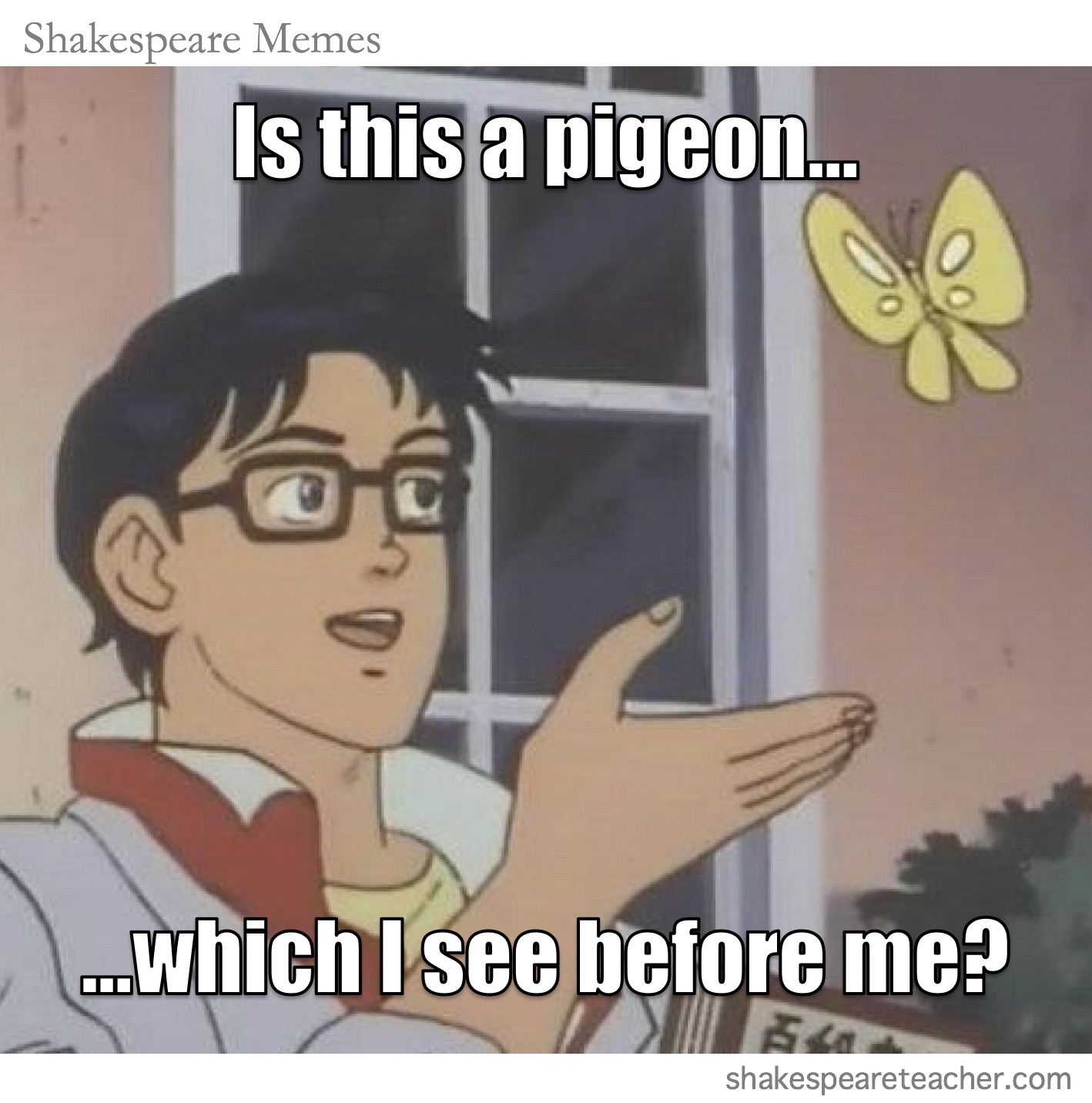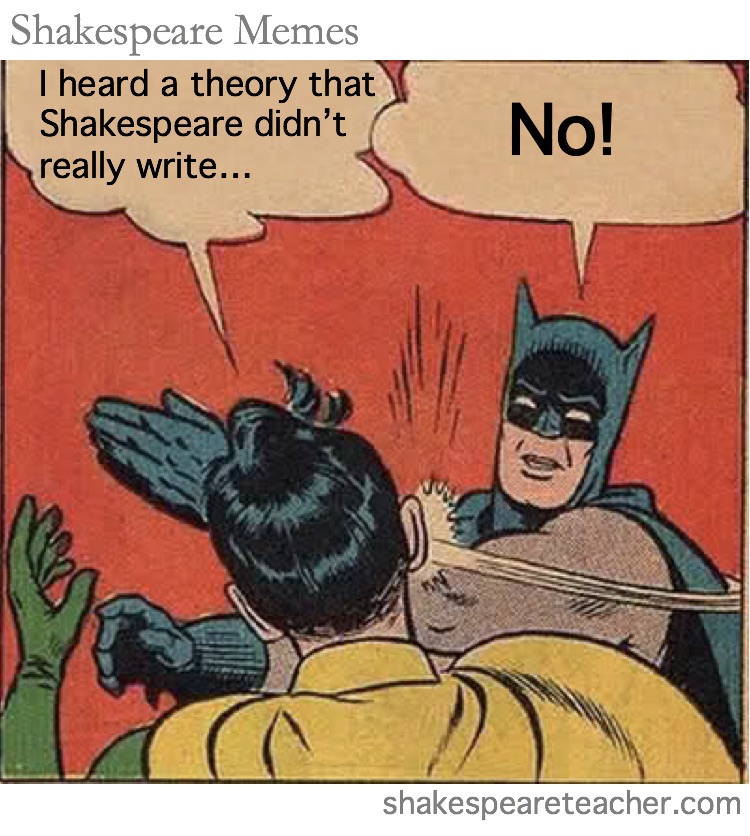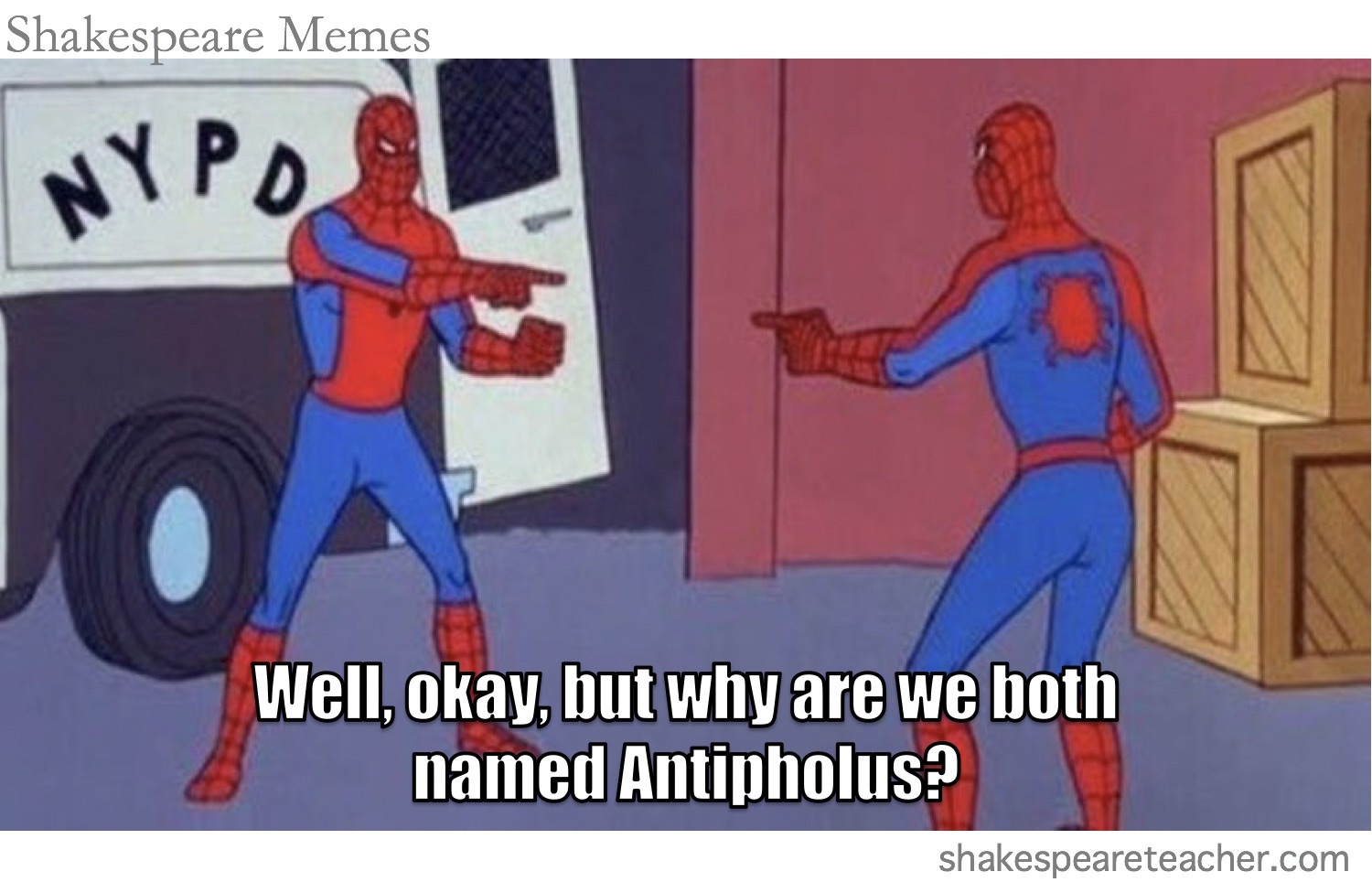Shakespeare Memes
Tuesday, April 23rd, 2019Happy 455th Birthday to Shakespeare!
In honor of the occasion, I present… Shakespeare Memes!















Happy 455th Birthday to Shakespeare!
In honor of the occasion, I present… Shakespeare Memes!















In this October 2016 TED talk, Shakespearean actor and educator Rob Crisell makes a passionate argument for Shakespeare, for teaching Shakespeare, and for teaching Shakespeare through performance. Whether you’re already with him on these three points or not, it’s well worth checking out:
From As You Like It:
Speak you so gently? Pardon me, I pray you:
I thought that all things had been savage here;
And therefore put I on the countenance
Of stern commandment.
Shift around the letters, and it becomes:
Hey!
They happen to be in a forest, so you condemn gents as an agenda of smug entitlement rather than put them out a hand?
Check your privilege, Orlando.
How far should we go to get people to read Shakespeare? I say we do whatever it takes.
You may also enjoy these stories:
Click the images above to read more!
My teenage daughter and her friends think that posts like this can’t go viral. Please help me teach them an important lesson by sharing this on Facebook and Twitter.
In As You Like It, Celia reveals to Rosalind that she knows the name of Rosalind’s secret admirer. It is Orlando, who has already captured her heart. Immediately, Rosalind begins to pepper Celia with an overwhelming litany of questions, which causes Celia to exclaim:
It is as easy to count atomies as to resolve the propositions of a lover
Wait, what? Isn’t this the same play that said that the world is six thousand years old? How could Celia possibly know about atomic theory? Fortunately, there’s no job too small for the Shakespeare Follow-Up.
According to my Folger edition of the play (Barbara A. Mowat and Paul Werstine, eds.), the word “atomies” as used here means “dust particles in sunlight.” Oh.

Thou tell’st me there is murder in mine eye:
’Tis pretty, sure, and very probable,
That eyes, that are the frail’st and softest things,
Who shut their coward gates on atomies,
Should be call’d tyrants, butchers, murderers!
So that would appear to be that. But, wait! According to my Arden edition (Juliet Dusinberre, ed.), there’s more to the story. “Atomies” does indeed mean “tiny particles,” but…
The word, which occurs twice in AYL (see 3.5.13) and in no other Shakespeare play, may suggest the territory of the research conducted by Ralegh’s navigator, Thomas Harriot, into the atom and into optics, with particular relation to the refraction of light and the nature of visions.
(We’ll get back to Harriot, but as a side note, you may remember that Mercutio also uses the word “atomies” in the Queen Mab speech. To be fair, I checked my Arden edition of Romeo and Juliet (Brian Gibbons, ed.), and found instead the word “atomi,” which is from Q1. The Folio has “atomies.” So it’s arguable whether the word appears in another play, but the Arden is at least consistent. Even if you say the word is unique to As You Like It, however, the concept does appear in at least one other play.)
Atomism, the theory that all matter is made up of smaller units that cannot be further divided, was an idea embraced by several Pre-Socratic philosophers, most notably Leucippus and Democratus. Aristotle rejected this theory, believing that the four elements (earth, water, air, and fire) were continuous and infinitely divisible. As with most of these kinds of arguments, Aristotle’s version won the day. Although there were some notable figures who did believe in atomism throughout the ages, Aristotle’s theory was still the prevailing concept even in Shakespeare’s day. So in Twelfth Night, Viola gets Olivia’s attention by telling her “you should not rest/ Between the elements of air and earth, But you should pity me!” as Sir Toby asks Sir Andrew “Does not our life consist of the four elements?” when trying to make a point.
However, even in Shakespeare’s early seventeenth century, atomism was making a comeback, boasting such impressive adherents as Francis Bacon, René Descartes, Thomas Hobbes, and even Galileo. Thomas Harriot was an early contributor to the developing theory, though at a time when it was still dangerous to speak too openly about what was considered a heretical idea. It’s intriguing to think that the notion may have captured Shakespeare’s imagination as well, but this is merely speculation. I don’t think you can strongly infer this from his use of a particular word twice in a given play, especially when the second use of the word points fairly decisively in the other direction.
In 1808, John Dalton (building on the work of Lavoisier and Proust) demonstrated that when a substance (such as water) is broken down into its components (such as hydrogen and oxygen), the proportion can always be described with small integers, implying that there is a direct correspondence on some foundational level. His atomic theory of matter led to further inquiry and discovery throughout the 19th century. In the early 20th century, quantum mechanics allowed scientists such as Max Planck, Albert Einstein, and Nils Bohr to describe the unique properties of particles on the microscopic scale.
There’s a lot more to the story, but it will have to suffice to note that in the mid-20th century, science learned how to split the atom, unleashing the potential for a virtually unlimited power source, weapons of unthinkable destruction, and a series of ethical questions that have turned out to be much more difficult to resolve than even the propositions of a lover.
In As You Like It, Le Beau gives some friendly advice to Orlando:
Good sir, I do in friendship counsel you
To leave this place. Albeit you have deserv’d
High commendation, true applause and love,
Yet such is now the duke’s condition
That he misconstrues all that you have done.
The duke is humorous: what he is indeed,
More suits you to conceive than I to speak of.
The duke is humorous? He doesn’t sound very humorous to me. Can we get a Shakespeare Follow-Up?
The “humours” referred to four bodily fluids that were believed to affect one’s mood and personality: blood, phlegm, yellow bile, and black bile. This was a theory that traced back as far as the ancient Greeks, and it was widely accepted in Shakespeare’s time. An imbalance of any one of these fluids in a person would have a particular effect. So, the duke is moody, not funny. And this use of the word is fairly consistent across the canon. So when Antipholus of Syracuse says he is not in a “sportive humour,” or Benedick says “a college of witcrackers cannot flout me out of my humour,” or Petruchio says “I’ll curb her mad and headstrong humour,” none of them are talking about the funny.
It’s clearly a retrochronism, but understanding a little bit about the humors can actually shed some light on quite a few lines in Shakespeare, so let’s review.
An excess of blood was thought to make you sanguine, and the cheerfully happy word actually comes from the Latin for bloody. So when Sir Toby Belch asks “Am not I consanguineous? am I not of her blood?,” he is using the term to describe a blood relationship.
Phlegm leads to quiet rationality. Kant actually thought it was the absence of temperament. Mistress Quickly therefore misapplies the term in The Merry Wives of Windsor when she beseeches Doctor Caius to “be not so phlegmatic.” She is trying to calm his anger down. She should have said “choleric.”
Choler stems from yellow bile (from the Greek “chole” for bile), and the word appears frequently in Shakespeare to describe anger or bellicosity. The black (“melan-“) variety of bile (“chole”) was also a frequently used theme. I’ve already written about melancholy in Shakespeare in an earlier post, so I don’t need to repeat it all here. The important thing to remember is that Shakespeare and his audience would have believed that these moods were caused by an imbalance of fluids. This is why bloodletting was such a popular medical practice; they believed they could remove the excess humours by drawing blood or applying leeches.
A poetic reference to bloodletting appears in King Richard II, as Richard attempts to sooth the conflict between Bolingbroke and Mowbray:
Wrath-kindled gentlemen, be rul’d by me;
Let’s purge this choler without letting blood:
This we prescribe, though no physician;
Deep malice makes too deep incision:
Forget, forgive; conclude and be agreed,
Our doctors say this is no month to bleed.
The complainants are seeking a duel, another way to purge choler by letting blood. Richard reframes their grievances as merely an imbalance of yellow bile, and uses the bloodletting metaphor to advocate a more peaceful solution. (It doesn’t work.)
In the 19th century, humours and bloodletting fell out of fashion as medical science developed a better understanding of human biochemistry. Apparently, though, the idea of the four humors survives today as a popular screenwriting technique.
On a somewhat-unrelated final note, do you know why the “funny bone” got its name? Because it’s the humerus! And I hope you find that humorous.
The term “nature vs. nurture” is a poetic turn of phrase that refers to an ongoing reexamination of the roles that heredity and environment play in determining who we are as individuals. The expression was popularized in the 19th century by Francis Galton, though the debate and the phrase had been around much longer than his day. In fact, Shakespeare himself juxtaposed the two words in The Tempest, as Prospero describes Caliban thusly:
A devil, a born devil, on whose nature
Nurture can never stick;
Shakespeare was not the first to contrast these two words, but Galton is known to have been a Shakespeare fan, and it seems reasonable to imagine this was his source.
Shakespeare’s plays are filled with models of the intricate workings of human nature, depictions of how individuals are influenced by external factors, and the complicated interplay between the two. As we will soon see, Shakespeare was also an early voice in this conversation, and an often-quoted source by later thinkers as well. Therefore, our Shakespeare Follow-Up will focus on the development of the nature vs. nurture debate from Shakespeare’s time to ours today.
But please note that this is a very large topic, and I’m going to sweep through it rather quickly, so feel free to do your own follow up on any topic here that interests you.
Political philosophers such as Hobbes, Locke, and Rousseau are often grouped together as “social contract theorists,” because they presented ideas about how and why humans form societies. But when considering their impact on the nature/nurture question, it’s more illustrative to focus on their differences.
In Leviathan (1651), Thomas Hobbes argued that human beings, existing in a state of nature, are savage and brutal. Therefore, we willingly surrender our autonomy to a sovereign unconditionally in order to gain security from our murderous brethren. John Locke, in An Essay Concerning Human Understanding (1689), lays out the idea that we refer to today as tabula rasa, or “the blank slate.” Rather than seeing human beings as being innately evil, as Hobbes does, he sees us as being neither good nor evil naturally, but rather open to influence from our environments. Jean-Jacques Rousseau presents a different view of the natural state of the human in his book Émile (1762). For Rousseau, humans are born innately good, and it is society that corrupts.
Naturally, the choice of which of these three views to adopt will have a profound effect on how a culture views education and child rearing. We can’t control the nature, but we can structure the nurture to make the best use of our understanding of it. If we believe that human beings are born evil, we’ll want to make discipline the backbone of our educational system. If we believe that children are blank slates, we’ll seek to fill those slates with our best models for citizenship and morality. If we believe that our students are innately good, then maybe the best thing we could do would be to just get out of the way and let them explore the world they find themselves in. You can hear echoes of these debates in today’s conversations about education.
In the post-Darwinian era, psychologists began to codify the progression of human development into various stages. The progression was determined by nature, but profoundly impacted by environment. Sigmund Freud described five psycho-sexual stages of development in childhood. The eight psycho-social stages outlined by Erik Erikson were strongly influenced by Freud, but extended to adulthood.
But wait! A lifetime of human progression divided into stages? Why does that sound familiar? Oh right…
All the world’s a stage,
And all the men and women merely players:
They have their exits and their entrances;
And one man in his time plays many parts,
His acts being seven ages. At first the infant,
Mewling and puking in the nurse’s arms.
And then the whining school-boy, with his satchel,
And shining morning face, creeping like snail
Unwillingly to school. And then the lover,
Sighing like furnace, with a woful ballad
Made to his mistress’ eyebrow. Then a soldier,
Full of strange oaths, and bearded like the pard,
Jealous in honour, sudden and quick in quarrel,
Seeking the bubble reputation
Even in the cannon’s mouth. And then the justice,
In fair round belly with good capon lin’d,
With eyes severe, and beard of formal cut,
Full of wise saws and modern instances;
And so he plays his part. The sixth age shifts
Into the lean and slipper’d pantaloon,
With spectacles on nose and pouch on side,
His youthful hose well sav’d, a world too wide
For his shrunk shank; and his big manly voice,
Turning again toward childish treble, pipes
And whistles in his sound. Last scene of all,
That ends this strange eventful history,
Is second childishness and mere oblivion,
Sans teeth, sans eyes, sans taste, sans everything.
It seems that Jacques in As You Like It was on the right track, centuries ahead of his time. Freud famously wrote about Hamlet, and Erikson even cites Shakespeare’s “ages of man” in his 1962 article “Youth: Fidelity and Diversity,” which also provides an in-depth discussion of Hamlet.
Jean Piaget (1896-1980) developed a set of four stages of cognitive development that have been profoundly influential in our understanding of human nature. Piaget believed that these stages developed naturally, and that new levels of learning become possible at each stage. Score one point for nature! Lev Vygotsky (1896 – 1934) built on these ideas, but demonstrated that learning could actually encourage cognitive development. There is a zone between what students are capable of doing on their own and what they can do in an environment that includes guidance and collaboration. Stretching into this zone can assist children in progressing developmentally. There’s one point for nurture, and it’s a tie game.
In fact, it will always be a tie game. Everyone agrees that both nature and nurture are significant, and we can argue about various degrees. Noam Chomsky (1928 – ) revolutionized the field of linguistics by describing, in Syntactic Structures (1957), the innate ability of the human brain to acquire language. This was a challenge to the behaviorist philosophy that was dominant at the time. In Frames of Mind (1983), Howard Gardner describes a system of multiple intelligences that different people seem to possess in different measures. The rise of theories such as Chomsky’s and Gardner’s would seem to move the needle towards nature, but the fact that they continue to influence our educational practices demonstrate the importance of nurture in the equation all the more powerfully.
Shakespeare, of course, didn’t know any of this. Nevertheless, his understanding of the complex interplay between nature and nurture was nuanced enough for him to create models that still have us debating the actions and motivations of fictional characters as though they were real people. Why, for example, does Macbeth kill Duncan? Is it because he’s ambitious? Or does he succumb to pressure from his wife? If it’s the former, would he have done so without prompting from the witches? And if it’s the latter, what elements of his nature make him susceptible to his wife’s influence?
I give up. What do you think, Lady Macbeth?
Glamis thou art, and Cawdor; and shalt be
What thou art promis’d. Yet do I fear thy nature;
It is too full o’ the milk of human kindness
To catch the nearest way; thou wouldst be great,
Art not without ambition, but without
The illness should attend it; what thou wouldst highly,
That thou wouldst holily; wouldst not play false,
And yet wouldst wrongly win; thou’dst have, great Glamis,
That which cries, ‘Thus thou must do, if thou have it;’
And that which rather thou dost fear to do
Than wishest should be undone. Hie thee hither,
That I may pour my spirits in thine ear,
And chastise with the valour of my tongue
All that impedes thee from the golden round,
Which fate and metaphysical aid doth seem
To have thee crown’d withal.
A lot of these Follow-Ups are about how much Shakespeare didn’t know. This one is about how much he still has to teach us.
One hidden benefit of the Shakespeare Follow-Up is that it can give me extra ideas for the Shakespeare Anagram!
From As You Like It:
The poor world is almost six thousand years old, and in all this time there was not any man died in his own person, videlicet, in a love-cause.
Shift around the letters, and it becomes:
Science winnows latent old isotope radiation dates and helps to show us our vivid earth is held many more years old than six millennia.
When, in As You Like It, Orlando threatens to die of unrequited love, the disguised Rosalind has some words of wisdom for him:
The poor world is almost six thousand years old, and in all this time there was not any man died in his own person, videlicet, in a love-cause.
Whether or not one could actually die from love will be beyond the scope of this Shakespeare Follow-Up. But we do want to examine how close is Rosalind’s estimate of the age of the planet to what we believe today.
Almost 6,000 years was a good guess for Shakespeare’s day. But today, scientists believe the Earth is over 4,500,000,000 years old, give or take. How can we account for such a breathtaking discrepancy?
Early estimates for the age of the planet were based on Biblical scripture. God created Earth “in the beginning” which puts its origin on the first day of creation. Adam was born on the 5th day, and then the begetting began. Genesis actually goes into quite a bit of detail about how old each begetter was when he begat, so a literal interpretation and little bit of arithmetic was all that was necessary to trace how much time passed since the first day of creation and pinpoint the age of the earth.
Dating creation at 4000 BC was a popular estimate during Shakespeare’s lifetime. Shortly after Shakespeare’s death, Bishop James Ussher published a chronology that placed the creation of the universe on Sunday, October 23, 4004 BC. Hey, someone has a birthday coming up!

Still, nature was rife with clues that were ready for us when we were ready for them. As early as the 17th century, Nicolas Steno noticed the questions raised by fossil evidence and rock stratification, and other naturalist scientists would find reason to revise the Earth’s age gradually upwards.
In 1862, Lord Kelvin (before he was Lord Kelvin) used the cooling rate of the Earth to place its age at around 98 million years. That’s not quite there yet, but Lord Kelvin was getting warmer!
In the 20th century, scientists began measuring the decay of radioactive isotopes for dating objects that are very old. This is called “radiometric dating” or “radioactive dating,” but I’m only going to call it radiometric dating because I already have something that I call radioactive dating. Radiometric dating puts a rock native to Quebec, the Acasta Gneiss, at over 4 billion years old, and certain zircons found in Western Australia turn out to be over 4.4 billion years old. Based on non-terrestrial evidence, scientists put the age of the solar system at around 4.567 billion years, meaning the Earth can’t be any older than that. This gives us a window between 4.4 and 4.567 billion years to place our best guess.
Although science is long past the time of an Earth whose age could be measured in the thousands, the general public is not as unified. According to a 2012 Gallup poll, 46% of Americans believe that “God created human beings pretty much in their present form at one time within the last 10,000 years or so.” Now, there is a difference between the age of the Earth and the age of the human being, but there is a lot of scientific evidence that humans have been around a lot longer than 10,000 years. Suffice it to say that the first homo sapiens are believed to have evolved in Africa about 200,000 years ago.
But whether, in all this time, there was any man who died in a love-cause, I leave as a question for the reader.
This is the last in a series of 40 pop-music parodies for Shakespeare fans.
So far, we’ve had one parody for each of Shakespeare’s 38 plays and one for the sonnets. We finish the Shakespeare Top 40 with a tribute to all of the plays, one last time.
Enjoy!
We Love the Plays of Shakespeare
sung to the tune of “We Didn’t Start the Fire” by Billy Joel(With appreciation to everyone who has followed along on the journey…)
Harry, Suffolk, Somerset,
Richard Plantagenet;
Warwick, Edward, Margaret, Rutland,
Younger Lord Clifford;
Lord John Talbot, Tony Woodeville,
Duke of Bedford, Joan La Pucelle;
Duke of Clarence, Tower Princes,
Richard the Third…Antipholus, Dromio,
Balthazar, Angelo;
Titus gets Tamora by
Baking her kids in a pie;
Tranio, Petruchio,
Katharina, Widow;
Proteus and Valentine have
Bid Verona goodbye…We love the plays of Shakespeare,
Jumping off the pages,
Burning up the stages.
We love the plays of Shakespeare.
First, we learned to read them.
Now, we go to see them.
Don Armado, French Princess,
Costard and Holofernes;
Romeo’s Apothecary,
Juliet’s Nurse;
Gaunt John, he passed on,
Henry’s back and Dick’s gone;
Quince, Flute, Snout, Snug,
Bottom’s got a curse…King John, Pope, France,
Bastard’s got a second chance;
Shylock and Antonio,
Portia and Bassanio;
Bardolph, Boar’s Head,
Prince Hal, Hotspur dead;
Tavern Hostess, Lord Chief Justice,
Henry on his deathbed…We love the plays of Shakespeare,
Jumping off the pages,
Burning up the stages.
We love the plays of Shakespeare.
First, we learned to read them.
Now, we go to see them.
Benedick, Beatrice,
Dogberry and Verges;
Cambridge, Scroop and Grey,
Fight on St. Crispin’s Day;
Cassius, Cicero,
Julius Caesar, Cato;
Duke Senior, Jacques,
Poems posted on the trees…O, O, O…
Olivia, Antonio,
Toby Belch, Malvolio;
Ophelia, Claudius,
Hamlet kills Polonius;
Falstaff once adored
Mistress Page and Mistress Ford;
Agamemnon, Pandarus,
Cressida and Troilus…We love the plays of Shakespeare,
Jumping off the pages,
Burning up the stages.
We love the plays of Shakespeare.
First, we learned to read them.
Now, we go to see them.
Helena for Bertram fell,
All’s Well that Ends Well;
Angelo, Claudio,
“Friar” Duke Vincentio;
Desdemona, Othello,
Duke, Iago, Cassio;
Kent’s stand, Lear’s Fool,
Edmund’s death, Edgar’s rule;
Three Witches, two Macbeths,
Scottish spirits come unsex;
Antony, Cleo P.,
Who else would you want to see?We love the plays of Shakespeare,
Jumping off the pages,
Burning up the stages.
We love the plays of Shakespeare.
First, we learned to read them.
Now, we go to see them.
Marcius, Cominius,
Volumnia, Aufidius;
Cupid, Lucius,
Timon, Flavius;
Gower, Thaliard, Pericles,
Antiochus, Simonides;
Posthumous is shipped to Rome,
Iachimo’s gone to his home…Autolycus, Leontes,
Perdita, Polixenes;
Stephano, Trinculo,
Ship, wreck, Prospero;
Henry starts a second life,
Anne Boleyn’s his second wife;
Kinsmen our guy partnered for;
May have helped with Thomas More…We love the plays of Shakespeare,
Jumping off the pages,
Burning up the stages.
We love the plays of Shakespeare.
And where we have gone,
The play will start anon,
Anon, anon, anon, anon, anon, anon, anon…We love the plays of Shakespeare,
Jumping off the pages,
Burning up the stages.
We love the plays of Shakespeare.
First, we learned to read them.
Now, we go to see them.We love the plays of Shakespeare!
Hat tip to Shakespeare Online for the chronology.
You can click to read all 40 song parodies here.